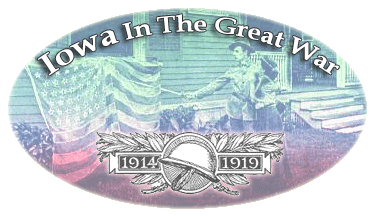|
|
|
Source: Oelwein Daily Register, July 7, 1921, pg. 4 |
|
STANLEY NEWS - |
| |
George W. Briny was born in
Sioux township, Lyon County, Iowa, on May 4, 1895 and died "somewhere
in France" October 2, 1918, being at the time of his death a few months
over twenty three years of age. Practically his entire life was spent
in this community and he was known to all. He was called in the draft
of April 26th of this year and was sent first to Camp Dodge, where he
remained but a short time. He was then transferred to a southern camp,
remaining there but a brief period and then went "over there." He was a
member of Co. B 345th Machine Gun Battalion, 90th Division, and had
participated in several engagements previous to his death. No
information as to when George was wounded or the nature of the wound
was ever received by Mr. and Mrs. Briny, the first word received for
eight weeks regarding George was the message from the War Department
announcing his death. He is survived by his parents, Mr. and Mrs. David
Briney of this place and a sister Mrs. Libby Washburn of near
Castleville, Iowa, in addition to numerous other relatives and friends.
The body arrived in Stanley Friday morning from France accompanied by
Corporal William F. Moyer of 53rd infantry of Camp Grant, Illinois.
The body was taken to the R.S. Zabriskie home where it remained
until Sunday when the funeral was held from the Union Church, Rev.
McCullough of said church delivering the sermon, and the American
Legion of Oelwein had charge of the rest of the services. The American
Legion male quartette, including one of Stanley's former soldier boys,
Lester Boots, now of Oelwein sang the three hymns. "Beautiful Isle of
Somewhere," "Rock of Ages" and "Nearer my God to Thee." Guards of honor
stood at each end of the casket during the services, after which the
remains were placed or laid on the caisson to be taken to the Stanley
cemetery to be laid at rest. The caisson was drawn by four horses,
which where led by four ex-soldiers in uniform. The pall bearers,
walking on each side of it. This was followed by the minister, the
mourners and about forty ex-service men in uniform, including the
firing squad and the two color guards who carried the Flag, also the
bugler and other friends who wished to show their respect for one who
gave his life for our country. The firing squad lined up on one side of
the grave, was called to order and gave the three shots of honor over
the grave, after which the bugle call was given by John Campbell, one
of Stanley's ex-soldiers. The pall bearers were all Stanley boys, Elmer
Morgan, Floyd Ingamells, August Ver Slius, Harold Paulson, Kyle
Ingamells and Emil Ver Slius. The community extends their heartfelt
sympathy to the bereaved parents and sister. |
| |
|


 George Briney
George Briney